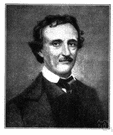Poe
Also found in: Thesaurus, Medical, Financial, Acronyms, Idioms, Encyclopedia, Wikipedia.
POE
abbr.
1. port of embarkation
2. port of entry
American Heritage® Dictionary of the English Language, Fifth Edition. Copyright © 2016 by Houghton Mifflin Harcourt Publishing Company. Published by Houghton Mifflin Harcourt Publishing Company. All rights reserved.
Poe
(pəʊ)n
(Biography) Edgar Allan. 1809–49, US short-story writer, poet, and critic. Most of his short stories, such as The Fall of the House of Usher (1839) and the Tales of the Grotesque and Arabesque (1840), are about death, decay, and madness. The Murders in the Rue Morgue (1841) is regarded as the first modern detective story
POE
abbreviation for
1. (Military) military port of embarkation
2. port of entry
Collins English Dictionary – Complete and Unabridged, 12th Edition 2014 © HarperCollins Publishers 1991, 1994, 1998, 2000, 2003, 2006, 2007, 2009, 2011, 2014
Poe
(poʊ)n.
Edgar Allan, 1809–49, U.S. short-story writer and poet.
POE
1. port of embarkation.
2. port of entry.
Random House Kernerman Webster's College Dictionary, © 2010 K Dictionaries Ltd. Copyright 2005, 1997, 1991 by Random House, Inc. All rights reserved.
ThesaurusAntonymsRelated WordsSynonymsLegend:
Switch to new thesaurus
| Noun | 1. |  Poe - United States writer and poet (1809-1849) Poe - United States writer and poet (1809-1849) |
Based on WordNet 3.0, Farlex clipart collection. © 2003-2012 Princeton University, Farlex Inc.
Translations
POE
[ˌpiːəʊˈiː] n abbr (=port of embarkation) → port m d'embarquement
(=port of entry) → port m de débarquement
Collins English/French Electronic Resource. © HarperCollins Publishers 2005